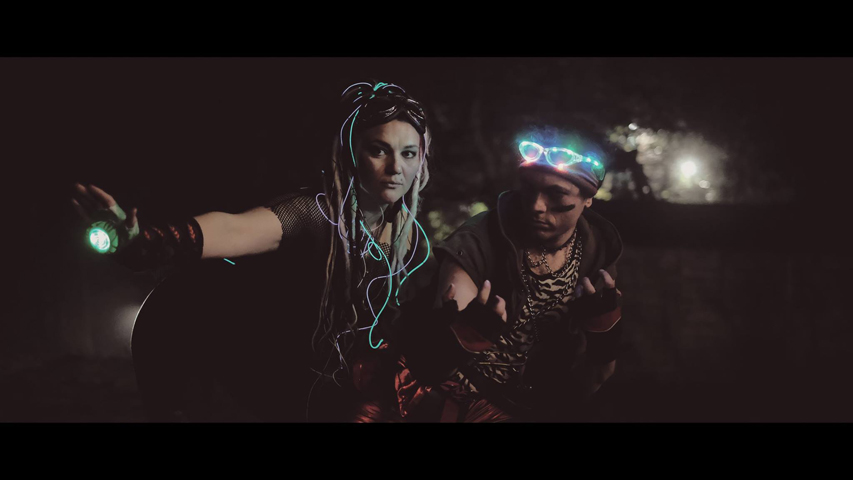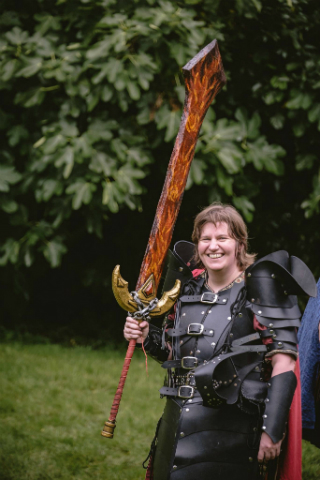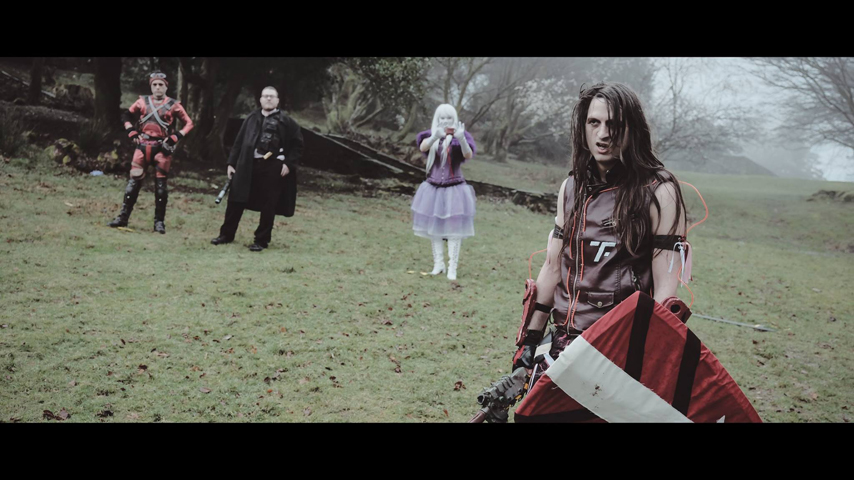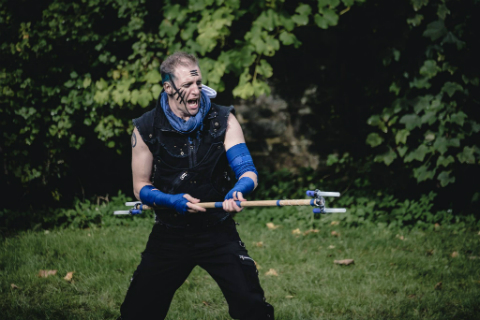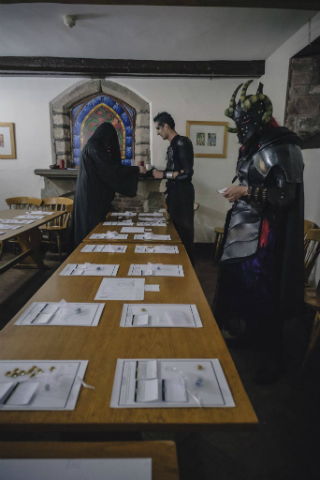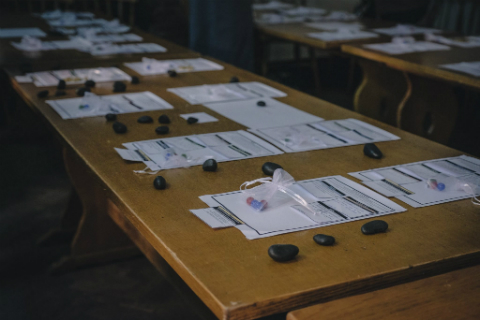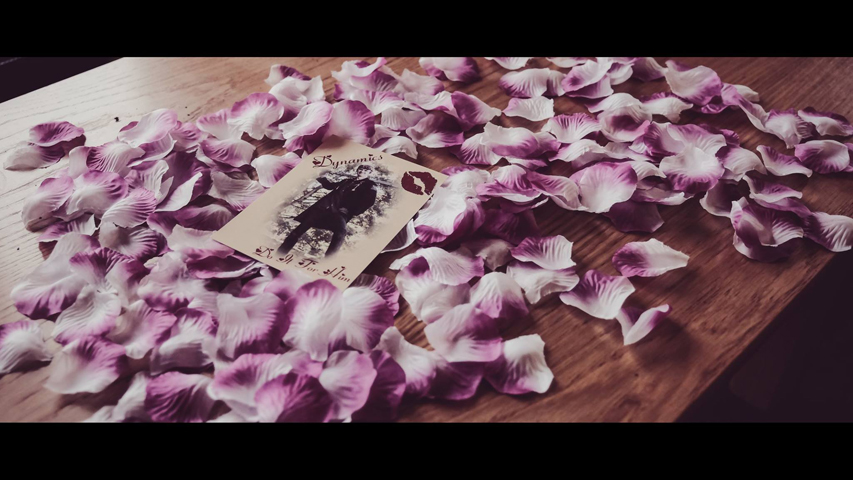Difference between revisions of "Rules"
m (errant capital) |
|||
| (61 intermediate revisions by 6 users not shown) | |||
| Line 1: | Line 1: | ||
| − | [ | + | '''A summary of the rules can be found in printable format [https://www.dropbox.com/s/c8nlkg1wbnhegvi/ReGenesis%20Rules%20Summary.docx?dl=1 here]. |
__TOC__ | __TOC__ | ||
| Line 5: | Line 5: | ||
<h2>The Game</h2> | <h2>The Game</h2> | ||
| − | [[File: | + | * '''ReGenesis will run an event in 2016, two events each in 2017 and 2018, and a finale in 2019. |
| + | * '''You may write your own free-text downtime. From your character’s perspective, it happens. | ||
| + | * '''You may communicate freely IC between events, including electronically. | ||
| + | * '''It is always acceptable to lie to people OC about IC events. | ||
| + | * '''You may run your own events, without shaping, geomancy or character death. | ||
| + | |||
| + | |||
| + | [[File:WalkerSovereignE2.jpg|centre]] | ||
| + | |||
ReGenesis will run in a fixed series of six events, starting in 2016 and running twice a year thereafter. | ReGenesis will run in a fixed series of six events, starting in 2016 and running twice a year thereafter. | ||
| − | Our aim is to use a different site for each event, reflecting the changing nature of the geomantic nexus - so you may find yourself in a country home at one event, an abandoned steel mill at another, and so on. | + | Our aim is to use a different site for each event, reflecting the changing nature of the geomantic nexus - so you may find yourself in a country home at one event, an abandoned steel mill at another, and so on. See the frontpage for details on the next event. Each event will run from 8pm on Friday evening to 2pm on Sunday afternoon. |
| − | + | ||
| − | + | ||
There is an IC reason that ReGenesis has a fixed run of six events: when creating the Outworld and the geomantic engines, the Sublime Concord built in a failsafe. At the end of the sixth event, the geomantic engines will power down, and the shaper's gift will fade with them. You will be left mortal once again, to live the remainder of your lives in the world you have created. | There is an IC reason that ReGenesis has a fixed run of six events: when creating the Outworld and the geomantic engines, the Sublime Concord built in a failsafe. At the end of the sixth event, the geomantic engines will power down, and the shaper's gift will fade with them. You will be left mortal once again, to live the remainder of your lives in the world you have created. | ||
| − | < | + | <h3>Downtime</h3> |
| − | + | Between events, the geomantic engines are dormant. Some shapers perceive no time as having passed at all; others have years to enjoy wild adventures in a world that shifts to meet their expectations. | |
| − | + | You may write fiction about your character's exploits between events, and we will upload them to the Outworld section of the wiki. All of these tales are 'canon' - they actually happen to your character. We will pluck details from them to create news for the next event, and inform how we brief our Petitioners. | |
| − | + | ||
| − | + | There are a few principles to bear in mind when writing fiction: | |
| − | + | ||
| − | + | ||
| − | + | 1. At the end of each event, a list of all Territories and the Qualities they contain will be posted up to the wiki. Territories, Qualities, and other mechanical game elements cannot be created or destroyed through fiction. Other shapers can never be physically harmed in fiction except by their player's consent. | |
| − | + | 2. If another character posts fiction that contradicts yours, '''both happen'''. Causality will fracture, and each player can choose which version of events they have perceived. To avoid this, we recommend checking with other players if you want to write fiction involving them (or their Territories). | |
| − | + | ||
| − | + | 3. While shapers can readily navigate the shifting wilderness between Territories, the mortal denizens of the Outworld cannot: they seem to get lost, perish, or disappear with uncanny reliability. Your fiction may not feature any kind of migration, invasion, or other movement of mortals between Territories. | |
| − | + | ||
| − | + | ||
| − | + | 4. Mana, trophies, item cards and qualities are features of the Geomantic Nexus, and did not appear to exist in Homeworld. | |
| − | For | + | 5. To facilitate transfer to the wiki, please include the fiction's title, authors' names and IC location when submitting. For preference, please also type it in plain text (no bold or italics) with double carriage returns (hit 'enter' twice) for new lines – it saves us a lot of editing! (If you want to add your own wiki-markup instead, that's also great.) |
| − | + | <h3>Communication</h3> | |
| − | - | + | It is our view that IC correspondence between events serves to actively enrich the game. We encourage people to communicate and coordinate freely, whether that be via letter, email, internet forum, or mini-event. It is trivial for shapers to re-establish a parallel for the Aethernet of the Homeworld, so these media can be considered IC. |
| − | + | We would ask that all appropriate communication is done IC, as doing so OC makes the game feel less like a contest of great ambitions and more like a chess match. The contents of the advanced shaping lists are the only 'secret' element of the game, and it is against the rules to divulge these OC. | |
| − | - | + | There is a tendency for players to get overexcited and enthuse OC about sensitive IC information (such as events or plans), or encourage others to do so. This reduces the scope for subterfuge in the game, and blurs the IC/OC divide in decision-making. To address this, we would like to take a slightly novel approach: |
| − | This | + | It is expressly acceptable to lie to (or otherwise deceive) other players OC about sensitive information. This is considered part of the social contract for players, who must not expect their peers to be honest with them. This is to ensure that information obtained this way cannot be trusted. |
| − | + | <h3>Player Events</h3> | |
| + | If you want to run a mini-event of your own between events, we welcome it. Characters can gather in the Outworld while the geomantic nexus is not active, and may be joined by mortals from those realms. You will not be able to take any action at a mini-event that requires an Apparition's intervention (Shaping items, taking Geomantic turns, forging or sundering Tethers, or placing Hexes), but otherwise you are free to structure them in any way that you like. | ||
| + | Please let the crew know if you are planning one of these events; we may be able to provide you with assistance, publicity, or help out as crew. | ||
| − | < | + | <br clear=all> |
| + | <h2>Policies</h2> | ||
| − | + | * '''You may not use any kind of force on anyone without their prior consent, except as required by the combat rules. | |
| + | * '''Any taken props must be returned on the owner’s demand. | ||
| + | * '''You may not touch another character without their OC consent. | ||
| + | * '''You may alter your character’s appearance as you like, except to resemble soulforges. | ||
| + | * '''You should not play a character who is prejudiced against others on basis of any aspect of physical form, gender, or sexuality. | ||
| + | * '''You are encouraged to respond to any perceived prejudice IC with disgust and disdain. | ||
| + | * '''You must not reference sexual violence during play, in character backgrounds, or during downtime communications. | ||
| + | * '''You may report any harassing behaviour by any attendee of the event. | ||
| + | * '''You may challenge any Apparition (referee) ruling once; escalate complaints afterwards. | ||
| − | |||
| − | |||
| − | |||
| − | + | [[File:PoliciesE2.jpg|centre]] | |
| − | |||
| − | + | <h3>Force And Contact</h3> | |
| − | <h3> | + | |
| − | [[ | + | Events are held in the geomantic nexus, where physical laws are secondary to the power of a shaper’s will. Save for the ritualised combat of [[Combat#Affronts|Affronts]], nobody can touch a shaper if they do not want to be touched – and their possessions are protected the same way. |
| − | + | ||
| − | + | ||
| − | + | You may not use any kind of physical force on another character, except to strike them in an Affront. You may not take any equipment or items that are on their person, pickpocket them, or snatch anything from their hands. If you pick up a prop that belongs to someone else, they may command you to return it at any time. This must always be immediately honoured without question. | |
| − | + | You should avoid making more than minimal physical contact with other players, unless you have previously obtained their OC consent to do so. It is always acceptable to briefly drop OC to check whether or not it is okay to initiate contact in a different way (example: “OC: Is it okay to sit on your lap?”). It is always acceptable to briefly drop OC to tell someone to stop physical contact or take a step away from you for any reason. This must always be immediately honoured without question. | |
| + | * [[Policies#Use Of Force|Use Of Force]] | ||
| + | * [[Policies#Physical Contact|Physical Contact]] | ||
| + | * [[Combat#Rule Calls|Rule Calls]] | ||
| − | <h3> | + | <h3>Appearance And Prejudice</h3> |
| − | + | Humans are the only truly sentient species in the Homeworld. They're a diverse bunch, made even more so by alchemical alteration, cosmetic biomancy, and ritual fallout. You are free to make cosmetic alterations to your appearance (such as unusual skin colours, animal ears, etc), as long as these would not be reasonably confused for the effects of a Soulforge. | |
| − | + | ||
| − | + | ||
| − | + | Some cultures used to discriminate against one another on the basis of sex or gender, sexuality or promiscuity, skin or hair colour, ear or tail length - the list goes on. Those cultures have since been subsumed by the four we see today, who see such prejudices as a wasteful and embarrassing custom. | |
| − | + | It is not appropriate to intentionally play a character who is prejudiced on the basis of physical form, gender, or sexuality. We recognise that people can act like this despite their best efforts: if you believe another character to be acting in this fashion, you are encouraged to react to it in-character with the disgust and disdain appropriate for someone who has retained such backward beliefs. | |
| + | * [[Policies#Appearance|Appearance]] | ||
| + | * [[Policies#Prejudice|Prejudice]] | ||
| − | <h3> | + | <h3>Assault And Harassment</h3> |
| − | + | The Outworld is an artificial plane of reality and, when creating it, the Sublime Concord made some changes. Sexual violence and sex with minors (or subhuman intelligences) is not possible in the gameworld; it is not even conceivable. It is as alien and impossible an idea as "the smell of blue" or "the tune of sand" is for (non-synaesthetic) people in our world. Reality simply doesn't work that way. | |
| − | + | You may not reference sexual assault in the game, in backgrounds, or in downtime fiction. If another player does so, they are breaking the rules: please report this via our complaints procedure. | |
| − | + | ||
| − | + | If another player is harassing you, whether IC or OC, please report this via our complaints procedure. The action we take will be dependent on the events that have occurred and your wishes. Typically, it will involve taking the player aside and informing them that a concern has been raised, and how they need to change their IC or OC behaviour in future. They will be monitored by the Apparitions to ensure that they comply. If they do not, they will be removed from the game. | |
| − | + | * [[Policies#Assault And Harassment|Assault And Harassment]] | |
| − | + | <h3>Complaints Procedure</h3> | |
| − | + | If you believe another player to be breaking the rules, you may call for an [[Glossary#Apparition|Apparition]]’s attention or take them aside afterwards to give a report. The Apparition may make an immediate judgement, or escalate the matter to the Head Apparition. | |
| + | If you believe an Apparition to have made an incorrect rules call, you may challenge it. If they assert that they are correct, you must obey the Apparition’s ruling without further question. Afterwards, you may report the matter to the Head Apparition. While we do our best to enforce the rules consistently, incorrect rulings may occur and remediation may not be practical in all cases. | ||
| + | If you believe an Apparition to be breaking the rules themselves, please report this to the Head Apparition as soon as possible. | ||
| + | |||
| + | * [[Policies#Complaints Procedure|Complaints Procedure]] | ||
| + | |||
| + | <h2>Shaping</h2> | ||
| + | |||
| + | * '''You can use mana tokens to create items that will give you new abilities in combat, or that be used in Geomancy. This is called Shaping. | ||
| + | * '''What you can create is determined by what Motives you have. | ||
| + | * '''If you have more than one Motive, you can create advanced items. The effects of advanced items are not public knowledge. | ||
| + | * '''You can choose what props you use to represent different items. | ||
| + | * '''Once a prop is used for an item, it cannot be used for another item. | ||
| + | * '''You should keep a separate OC pouch to store cards that describe your game abilities. | ||
| + | * '''You cannot snatch or pickpocket item cards from other people. | ||
| + | |||
| + | |||
| + | [[File:ShapingE2.jpg|centre]] | ||
| − | |||
<h3>Mana</h3> | <h3>Mana</h3> | ||
| Line 119: | Line 141: | ||
'''RED''' mana is the essence of discontent, aggression, and change. It is used to create items that destroy or disrupt. | '''RED''' mana is the essence of discontent, aggression, and change. It is used to create items that destroy or disrupt. | ||
| − | You will receive a regular stipend of | + | You will receive a regular stipend of mana at the beginning of each event; its type is determined by the Quality you chose to start with. You can expect to acquire somewhere between two and twenty more mana during the course of each event, depending on how successful you are at Geomancy. |
| + | |||
| + | * [[Shaping#Mana|Mana]] | ||
<br clear=all> | <br clear=all> | ||
| − | + | <h3>Motives</h3> | |
| − | + | ||
| − | <h3> | + | |
---- | ---- | ||
| − | [[File: | + | [[File:MajestyE1.jpg|right]] |
| − | + | What defines a shaper's ability is the will and purpose behind it. When you create your character, there are seven Motives to choose from: Challenge, Devotion, Gratification, Influence, Knowledge, Loyalty, and Supremacy. You may choose two of the three Motives favoured by your culture, or one that is not. | |
| − | + | Motives determine how you can augment your character's relationships into powerful [[Tethers]]. They also determine what you can shape: each of the seven Motives has a unique list of items that they can create with mana, the contents of which are universal knowledge. Once created, items can be freely traded or given to others. | |
| − | + | * [[Shaping#Motives|Motives]]<br> | |
| + | * [[Shaping#Motive Descriptions|Motive Descriptions]]<br> | ||
| + | * [[Shaping:All|Shaping lists]]<br> | ||
| + | ** [[Shaping:Challenge|Challenge shaping list]] | ||
| + | ** [[Shaping:Devotion|Devotion shaping list]] | ||
| + | ** [[Shaping:Gratification|Gratification shaping list]] | ||
| + | ** [[Shaping:Influence|Influence shaping list]] | ||
| + | ** [[Shaping:Knowledge|Knowledge shaping list]] | ||
| + | ** [[Shaping:Loyalty|Loyalty shaping list]] | ||
| + | ** [[Shaping:Supremacy|Supremacy shaping list]] | ||
| + | * [[Shaping#Advanced_Shaping_Lists|Advanced shaping lists]]<br> | ||
<br clear=all> | <br clear=all> | ||
| + | <h3>Shaped Items</h3> | ||
| + | ---- | ||
| + | [[File:ShapingE1.jpg|right]] | ||
| + | Characters do not learn new skills; they are already as powerful as gods. They can increase their capabilities through Tethers they forge with others (more on these later), and through Shaping items. This is a process of using mana to enrich a mundane item with divine-grade power. When you equip that item, you gain its abilities. | ||
| − | + | * [[Shaping#Creating Items|Creating Items]] | |
| − | + | ||
| − | [[ | + | |
| − | + | ||
| − | + | In the world of ReGenesis, magic and technology are one and the same - possibilities made real by the ingenuity and hard work of shapers. To this end, we use an open physrepping system. An item's description will tell you whether it is one-handed or two-handed, an outfit, or an accessory. It will also tell you whether it can be used to parry melee attacks, and thus needs to be LRP-safe. You can then pick a prop that matches these requirements, the effects it creates, and your own characterisation. | |
| − | + | * [[Shaping#Open Physrepping|Open Physrepping]]<br> | |
| + | * [[Shaping#Item Types|Item Types]]<br> | ||
| + | * [[Shaping#Unpaired Items|Unpaired Items]]<br> | ||
| + | * [[Shaping#Changing Props|Changing Props]]<br> | ||
| + | * [[Shaping#Augmentations|Augmentations]]<br> | ||
| − | + | You do not need to attach the card that represents your item to your prop. Instead, keep an OC pouch (which can be a pocket or bag) somewhere on your person, and keep all of your item cards there. People cannot steal your gear just by taking the prop - these are the armaments of gods, and a shaper can manipulate the fabric of the Nexus to return it to their hands. | |
| − | + | * [[Shaping#The OC Pouch|The OC Pouch]]<br> | |
| + | * [[Shaping#Theft|Theft]]<br> | ||
| + | * [[Shaping#Equipping and Unequipping|Equipping and Unequipping]]<br> | ||
| − | + | If you do not have access to shaped battle gear, any suitable prop can be used to provide basic combat benefits. | |
| − | + | * [[Shaping#Unshaped Items|Unshaped Items]] | |
| + | <h2>Combat</h2> | ||
| − | <h3> | + | * '''You can declare an Affront, a formal four-a-side duel, against your enemies. |
| + | * '''Whoever wins an Affront can place Hexes (curses) on the losing side. | ||
| + | * '''Your character has a single score, Morale, that tracks their health and is spent on abilities. This cannot exceed your character’s maximum Morale (normally 5). | ||
| + | * '''Your abilities are provided by the items your character has equipped. | ||
| + | * '''When you reach 0 Morale or lower, you are KO’d and unable to fight. Call ‘K-O!’ | ||
| + | * '''Your character will have an Affinity that makes some kinds of abilities more efficient to use. | ||
| + | * '''Using abilities may require you to perform a dramatic Stunt of your own devising. | ||
| + | * '''To target someone at a range, point at them and call their name, or other signifier. | ||
| + | * '''To target a group of people, indicate an arc up to 90 degrees wide with your arms and all ‘YOU LOT!’ | ||
| + | |||
| + | |||
| + | [[File:JoyEffectE2a.jpg|centre]] | ||
| + | |||
| + | |||
| + | <h3>Affronts</h3> | ||
---- | ---- | ||
| − | |||
| − | + | At events, shapers inhabit the vast geomantic apparatus left behind by the Sublime Concord. They hold sway over reality, and as such cannot be hurt by one another except in an Affront. | |
| − | + | Anyone can declare an Affront against anyone else, and they will be given a time when it will be resolved. At this time, the challenger and defender make their way to the duelling grounds, where each will be given the opportunity to call forward three team-mates (who must consent). | |
| + | |||
| + | Once both sides have had their opportunity to speak their part before the assembled onlookers, battle is joined. The four-on-four duel continues until all members of one team are taken out of the fight. | ||
| + | |||
| + | * [[Combat#Declaring_An_Affront|Declaring An Affront]]<br> | ||
| + | * [[Combat#Naming Supporters|Naming Supporters]]<br> | ||
| + | * [[Combat#Nominating A Second|Nominating A Seconrd]]<br> | ||
| + | * [[Combat#Resolving An Affront|Resolving An Affront]]<br> | ||
| + | * [[Combat#Applying Hexes|Applying Hexes]]<br> | ||
| + | * [[Combat#Breaches Of Procedure|Breaches Of Procedure]]<br> | ||
| + | |||
| + | The members of the winning team who are still standing can each place a [[Combat#Hexes|Hex]] - a shaped curse - on a member of the losing team. The most vicious Hex is lethal, but all of them have cruel and debilitating effects. | ||
| + | |||
| + | * [[Combat#Hexes|Hexes]] | ||
| + | * [[Combat#Hextwister Cards|Hextwisters]] | ||
<br clear=all> | <br clear=all> | ||
| − | <h3> | + | <h3>Morale</h3> |
---- | ---- | ||
| − | |||
| − | + | ReGenesis uses a single tracked number, Morale, in combat. Morale represents a combination of your physical health, fatigue, resolve, and the condition of your equipment. Each character has a maximum Morale they can attain, typically five, and is taken out of the fight if they reach zero. | |
| − | You | + | You lose Morale by getting hit with attacks. You gain Morale from the support of your allies' abilities, and from some items - ones that unlock victory taunts, for example. |
| − | + | Have Morale to spare? Spend it on unleashing supermoves. | |
| + | |||
| + | *[[Combat#Morale|Morale]] | ||
| + | ** [[Combat#Maximum Morale|Maximum Morale]] | ||
| + | ** [[Combat#Losing Morale|Losing Morale]] | ||
| + | ** [[Combat#Becoming KO'd|Becoming KO'd]] | ||
| + | ** [[Combat#Spending Morale|Spending Morale]] | ||
| + | ** [[Combat#Gaining Morale|Gaining Morale]] | ||
<br clear=all> | <br clear=all> | ||
| − | + | <h3>Affinities</h3> | |
| − | <h3> | + | |
---- | ---- | ||
| − | [[File: | + | [[File:AffinitiesE1.jpg|right]] |
| − | + | You can choose one Affinity for your character. These enhance the benefit of some items, providing you with a distinct edge in combat. You may choose your Affinity as part of character creation, and change it freely between events. | |
| + | |||
| + | * '''Bastions''' are the front of a team’s vanguard, and the bulwark of their defence. | ||
| + | * '''Edges''' can throw out incredible damage without falter, as long as they are where they want to be – in the thick of melee combat. | ||
| + | * '''Keystones''' are the lynchpin of their team, exhorting their peers to acts of greatness and bringing fallen warriors back into the fight. | ||
| + | * '''Tempests''' work best behind the lines, bombarding their opponents with torrents of fire or a storm of projectiles. | ||
| − | + | * [[Combat#Affinities|Affinities]]<br> | |
| + | ** [[Combat#Bastions|Bastions]]<br> | ||
| + | ** [[Combat#Edges|Edges]]<br> | ||
| + | ** [[Combat#Keystones|Keystones]]<br> | ||
| + | ** [[Combat#Tempests|Tempests]] | ||
<br clear=all> | <br clear=all> | ||
| − | <h3> | + | |
| + | <h3>Stunts</h3> | ||
---- | ---- | ||
| − | [[File: | + | [[File:StuntsE1.jpg|right]] |
| − | + | Ranged attacks, and many support abilities, need you to perform a Stunt first. This is a combination of movement and speech (or sound effects from your equipment) that lasts at least five seconds. You should design your own Stunts to fit your characterisation, and the ability in question. These will help you time your attacks, and look fantastic. | |
| − | + | ||
| − | + | ||
| − | + | While changes of footing for the purposes of posing and wild gesticulation is allowed (and encouraged), you may not move from the spot you are standing while you are performing a Stunt. Moving from the spot (or being hit by a FZAM!, POW!, or WUMF! call's special effect) will cause the Stunt to fail, and it must be started again. | |
| − | + | ||
| − | + | ||
| − | + | ||
| − | + | ||
| − | + | * [[Combat#Activating Abilities|Activating Abilities]] | |
| + | * [[Combat#Stunt|Stunts]] | ||
| + | ** [[Combat#Stunting Restrictions|Stunting Restrictions]] | ||
| + | ** [[Combat#Holding A Stunt|Holding A Stunt]] | ||
<br clear=all> | <br clear=all> | ||
| − | <h3> | + | <h3>Calls</h3> |
---- | ---- | ||
| − | [[File: | + | [[File:CallsE1.jpg|right]] |
| − | + | ||
| − | + | * '''You may only make one damage or special effect call every five seconds. | |
| + | * '''The basic damage call, ‘HA!’, causes you to lose 1 Morale. | ||
| + | ** '''‘FZAM!’ also disables your ability to Stunt or make calls for five seconds. | ||
| + | ** '''‘POW!’ also knocks you to the ground, or to a crouch for five seconds. | ||
| + | ** '''‘SHANG!’ also causes you to lose 2 more Morale if you’re under another effect. | ||
| + | ** '''‘WUMF!’ also causes you to be knocked back until you have covered ten metres. | ||
| + | ** '''‘GET SOME!’ forces you to make a special damage call on the caller before you do so against anyone else. | ||
| + | ** '''‘-UP!’ restores points of Morale (‘ONE-UP’ restores 1, ‘TWO-UP’ restores 2, etc) | ||
| + | ** '''‘REVIVE!’ allows you to return to the fight on 1 Morale if you have been KO’d. | ||
| + | * '''If you have an ability that protects against some of a call’s effects, call ‘PING!’ to use it. | ||
| + | * '''If you have an ability that restores your own Morale, call ‘YEAH!’ when you use it. | ||
| − | |||
| + | There are eight calls in ReGenesis: the basic damage call ('HA!'), four special damage calls ('FZAM!', 'POW!', 'SHANG!", and 'WUMF!'), and three special calls ('GET SOME!', '-UP!', and 'REVIVE!'). | ||
| − | + | Shapers are not felled by casual violence; to hurt one, you need your full focus and conviction behind each blow. After each call you make, you must wait at least five seconds before making the next one. | |
| − | + | ||
| − | + | ||
| − | + | ||
| − | + | * [[Combat#Making_Calls|Making Calls]]<br> | |
| + | * [[Combat#Effect_Calls|Effect Calls]]<br> | ||
| + | ** [[Combat#HA|"HA!"]]<br> | ||
| + | ** [[Combat#FZAM|"FZAM!"]]<br> | ||
| + | ** [[Combat#POW|"POW!"]]<br> | ||
| + | ** [[Combat#WUMF|"WUMF!"]]<br> | ||
| + | ** [[Combat#SHANG|"SHANG!"]]<br> | ||
| + | ** [[Combat#UP|"-UP!"]]<br> | ||
| + | ** [[Combat#REVIVE|"REVIVE!"]]<br> | ||
| + | ** [[Combat#GET SOME|"GET SOME!"]]<br> | ||
| + | * [[Combat#Call_Prefixes|Call Prefixes]]<br> | ||
| + | ** [[Combat#YOU|"YOU:"]]<br> | ||
| + | ** [[Combat#YOU LOT|"YOU LOT:"]]<br> | ||
| + | * [[Combat#Reactive_Calls|Reactive Calls]]<br> | ||
| − | + | <br clear=all> | |
<br clear=all> | <br clear=all> | ||
| − | <h2> | + | <h2>Geomancy</h2> |
| − | + | ||
| − | + | ||
| − | + | ||
| − | + | ||
| − | + | * '''Every character has a Territory in the game world, which is an expression of their nature. | |
| + | * '''Characters from your Territory, called Petitioners, will arrive at events to speak with you. | ||
| + | * '''Your Territory will provide you with mana with which to create items, and a measure of social power called Majesty. | ||
| + | * '''You can add features, called Qualities, to Territories in order to change them. | ||
| + | * '''Your Territory exists in a Realm with those of other characters from your original culture. | ||
| + | * '''The character whose Territory has accrued the most Majesty in their Realm is named its Sovereign. They gain the ability to place or remove an Aegis, a powerful protective ward. | ||
| + | * '''Sovereigns may also be awarded Trophies, which can be used to create powerful geomantic tools or weapons called Grand Qualities. | ||
| + | * '''Some Qualities will cause your Realm to accrue a measure of toxic energy called Dissonance. | ||
| − | |||
| − | + | [[File:PenitentPhilosophyE2.jpg|centre]] | |
| − | |||
| + | * [[Geomancy#Geomancy Concepts|Concepts]] | ||
| − | <h3> | + | <h3>Territories</h3> |
---- | ---- | ||
| − | [[File: | + | [[File:GeomancyE1.jpg|right]] |
| − | + | When a shaper enters the rift, their essence is threaded into the world by the geomantic engines. This creates their Territory, a pocket of stable reality adrift in the primordial fabric of the Outworld. As part of character creation, you may name and describe your Territory. This Territory, and its description, will appear as a placard on the Geomantic tables. | |
| − | + | * [[Geomancy#Territories|Territories]] | |
| − | + | Territories will always feature sentient human life, brought into being when the lands form. As the flow of geomancy changes your Territory - for better and worse - these mortals will appear at events as Petitioners, there to meet their creators and praise, beg, inform, quiz, or harangue you. | |
| − | + | * [[Geomancy#Petitioners|Petitioners]] | |
| − | + | Prominent features of the gameworld can be created by you at the Shaping tables, as Qualities. These can be brought into being by placing them on a Territory at the Geomantic tables, allowing them to enhance or impede the flow of resources from that Territory. When you create Qualities, you may describe what form they take - these will appear on the Quality's card on the Geomantic tables, and be included in the map of the Outworld at the end of each event. | |
| − | + | * [[Geomancy#Qualities|Qualities]] | |
| + | * [[Geomancy#Quality Effects|Quality Effects]] | ||
| + | * [[Geomancy#Duplicate Qualities|Duplicate Qualities]] | ||
| + | * [[Geomancy#Permanent Qualities|Permanent Qualities]] | ||
| + | * [[Geomancy#Positive and Negative Qualities|Positive and Negative Qualities]] | ||
| + | * [[Geomancy#Moving Qualities|Moving Qualities]] | ||
| − | < | + | <h3>Geomantic Cycles</h3> |
| − | + | ||
---- | ---- | ||
| − | + | [[File:YourTurnE1.jpg|right]] | |
| − | + | There are five Geomantic Cycles each event, and you may make one move on the [[Glossary#Geomantic tables|Geomantic tables]] during each cycle. This includes collecting mana that has been generated by your Territory since the last Cycle, placing a Quality on a Territory of your choice, and a few other optional actions. | |
| − | + | [[Geomancy#Cycles|Cycles]] | |
| + | * [[Geomancy#Cycle Timings|Cycle Timings]] | ||
| + | * [[Geomancy#Resource Generation|Resource Generation]] | ||
| + | * [[Geomancy#Your Turn|Your Turn]] | ||
| − | |||
| − | |||
| − | |||
| − | |||
| − | |||
| − | |||
| − | |||
<br clear=all> | <br clear=all> | ||
| − | <h3> | + | <h3>Realms & Majesty</h3> |
| − | + | ||
---- | ---- | ||
| + | [[File:TrophiesE1.jpg|right]] | ||
| + | The protean landscape of the Outworld is divided into five broad areas called Realms, each of which is represented by one of the Geomancy tables. Your Territory begins in the same Realm as everyone else from your origin, although it is possible to move it to another. | ||
| − | + | The Outworld recognises true splendour, which is counted in Majesty. Your Territory may have Qualities that allow it to generate Majesty, which is stored as tokens on its placard. | |
| − | + | At the end of each Cycle, Majesty is counted. The character whose has accumulated the most Majesty in their Realm is recognised by the Apparitions as its Sovereign, who is granted additional powers. | |
| − | + | ||
| − | + | * [[Geomancy#Majesty|Majesty]] | |
| + | * [[Geomancy#Choosing_A_Sovereign|Choosing A Sovereign]]<br> | ||
| + | * [[Geomancy#Sovereign_Roles|Sovereign Roles]]<br> | ||
| + | * [[Geomancy#Sovereign_Powers|Sovereign Powers]] | ||
| − | |||
| − | |||
<br clear=all> | <br clear=all> | ||
| − | <h3> | + | <h3>Dissonance</h3> |
| − | + | ||
---- | ---- | ||
| − | + | [[File:DissonanceE1.jpg|right]] | |
| − | + | The world bends to accommodate the will of shapers. When two of them come into opposition, it can be impossible to fulfil both of their ambitions. That twist in the world can become a shear - events become confused, memories clash, and places fracture. This effect is known as Dissonance, and is largely responsible for the present ruin of the Homeworld. | |
| − | + | ||
| − | + | In the Outworld, you share a Dissonance pool with other members of your realm. Dissonance can be generated by the process of trying to extract mana, but the efforts of your enemies (or your overzealous friends) can greatly increase its accrual. The more Dissonance your Realm accrues, the harder it will be for it to acquire Trophies. | |
| − | + | * [[Geomancy#Dissonance|Dissonance]] | |
| − | + | ||
| − | + | ||
<br clear=all> | <br clear=all> | ||
| − | <h3> | + | <h3>Trophies and Grand Qualities</h3> |
| − | + | ||
---- | ---- | ||
| − | + | [[File:MotivesE1.jpg|right]] | |
| − | + | Trophies are items of singular power. This is a special resource that can be combined with mana at the Shaping desk to produce a Grand Quality. There are 21 different Grand Qualities, one for each different advanced shaping list. | |
| − | + | ||
| − | - | + | Grand Qualities are used at the Geomantic tables in the same way as Qualities are, but have extraordinary and often far-reaching effects. They may be superweapons, sources of great riches, or powerful strategic tools. Every use of a Grand Quality has potential to significantly change the balance of power in the Outworld. |
| + | |||
| + | * [[Geomancy#Trophies|Trophies]] | ||
| + | * [[Geomancy#Grand Qualities|Grand Qualities]] | ||
| − | |||
| − | |||
| − | |||
<br clear=all> | <br clear=all> | ||
| − | < | + | <h2>Tethers</h2> |
| − | + | ||
| − | + | ||
| − | + | ||
| − | + | * '''You can create an emotional link (Tether) with another character for each of your Motives. | |
| − | + | * '''Any Tethers that you are part of will provide you with new abilities. | |
| − | + | * '''Some Tethers require you to get permission from the other character to forge (create) them. | |
| + | * '''Some Tethers have restrictions on who can sunder (break) them. | ||
| + | |||
| + | |||
| + | [[File:TethersE2.jpg|centre]] | ||
| − | |||
| − | |||
| − | |||
| − | <h3> | + | <h3>About Tethers</h3> |
| − | + | ||
---- | ---- | ||
| − | + | Tethers are rituals that enhance the relationship between two shapers with metaphysical significance, granting them more power. Each of your Motives allows you to forge one Tether of the appropriate type with another character, although you can be the recipient of any number of Tethers created by others. Forging a Tether involves a public declaration and, for many types, a response from the subject granting their assent. | |
| − | + | * [[Tethers#Forging_Tethers|Forging Tethers]]<br> | |
| − | + | * [[Tethers#Sundering_Tethers|Sundering Tethers]]<br> | |
| − | + | * [[Tethers#Roleplaying and Tethers|Roleplaying and Tethers]] | |
| + | |||
| + | Tethers can provide you with new combat capabilities when you are fighting alongside (or against) each other; provide a variety of benefits in geomancy; or grant access to new shaping lists. Depending on the type of Tether, these benefits may be distributed unevenly between the two characters, or require them to work together to receive them. | ||
| + | |||
| + | <h3>Types Of Tether</h3> | ||
| + | ---- | ||
| + | The different types of Tether (and their corresponding Motives) are: | ||
| − | + | * [[Tethers#Enmity|Enmity (Supremacy)]]<br> | |
| − | + | * [[Tethers#Kinship|Kinship (Loyalty)]]<br> | |
| + | * [[Tethers#Obsession|Obsession (Gratification)]]<br> | ||
| + | * [[Tethers#Patronage|Patronage (Influence)]]<br> | ||
| + | * [[Tethers#Partnership|Partnership (Devotion)]]<br> | ||
| + | * [[Tethers#Rivalry|Rivalry (Challenge)]]<br> | ||
| + | * [[Tethers#Tutelage|Tutelage (Knowledge)]]<br> | ||
<br clear=all> | <br clear=all> | ||
| − | < | + | <h2>Mortality</h2> |
| − | [[File: | + | |
| + | * '''Characters can only become Doomed by their own hand, or with a lethal Hex. | ||
| + | * '''When you are Doomed, you cannot take turns at Geomancy, fight in Affronts, create Shaped items, change your Tethers, or consume Soulforging seeds. | ||
| + | * '''You will die at a point of your choosing within an hour of becoming Doomed. | ||
| + | * '''When dead, you cannot interact with other characters or use any abilities. | ||
| + | * '''If you were killed by another character, the Qualities on your Territory will curse them. | ||
| + | ** '''Your negative Qualities will be transferred onto their Territory. | ||
| + | ** '''Your positive Qualities will be converted into Dissonance for their Realm. | ||
| + | * '''Your Territory will be removed. You may then create a new character. | ||
| + | * '''You can create items called Soulforging seeds that will change what happens when you die. | ||
| + | * '''Consuming a Soulforging seed requires you to change your appearance appropriately. | ||
| + | |||
| + | |||
| + | [[File:ValtarianCostumeE2.jpg|centre]] | ||
| + | |||
| + | |||
| + | <h3>Death And Aftermath</h3> | ||
---- | ---- | ||
| − | + | [[File:Aftermath.jpg|right]] | |
| − | + | Shapers are infused with narrative power, and woven into the very fabric of the world: killing them is no simple task. They may die either by their own hand, or by being cursed with a Hex after an Affront. | |
| − | + | In each case, they become '''Doomed'''. At a point in the next hour, you will die - you may choose when. Your Territory is removed from the geomantic tables, and any shaped items you have remaining with you are forever lost. | |
| − | - | + | |
| − | + | * [[Mortality#Becoming Doomed|Becoming Doomed]] | |
| + | * [[Mortality#Being Doomed|Being Doomed]] | ||
| + | * [[Mortality#Dying|Dying]] | ||
| + | |||
| + | If a shaper is killed by a [[Combat#Hexes|Hex]], the consequences are more dire. The geomantic engines convulse, and everything the shaper has touched turns its wrath upon their murderer. This cascade of destructive narrative power is known as Aftermath. | ||
| + | |||
| + | * [[Mortality#Aftermath|Aftermath]] | ||
| − | |||
| − | |||
<br clear=all> | <br clear=all> | ||
| − | <h3> | + | |
| − | + | <h3>Soulforges</h3> | |
---- | ---- | ||
| − | + | [[File:Soulforging.jpg|right]] | |
| − | + | The death of a shaper is a massive event that sends ripples through the [[Glossary#Outworld|Outworld]]. Now that they have access to the geomantic engines, shapers can change what form those ripples take - by changing the nature of their own essence. This new art is called Soulforging. Soulforging can enhance the effect of your Aftermath, allow you to devour the essence of other shapers, give you control over your legacy, or even allow you to cling tenuously to life after death. | |
| − | - | + | |
| − | + | ||
| − | + | * [[Mortality#About_Soulforging|About Soulforging]] | |
| − | + | ||
| − | <br | + | Soulforging seeds can be created at the shaping table. There are seven different types of seed - Blossoming, Mechanical, Penumbral, Pestilent, Primal, Shimmering, and Venomous - one for each Motive's shaping list. Once created, you can use them yourself or trade them with others. |
| + | |||
| + | * [[Mortality#Venomous_Soulforge|Venomous Soulforge]]<br> | ||
| + | * [[Mortality#Mechanical_Soulforge|Mechanical Soulforge]]<br> | ||
| + | * [[Mortality#Pestilent_Soulforge|Pestilent Soulforge]]<br> | ||
| + | * [[Mortality#Primal_Soulforge|Primal Soulforge]]<br> | ||
| + | * [[Mortality#Shimmering_Soulforge|Shimmering Soulforge]]<br> | ||
| + | * [[Mortality#Blossoming_Soulforge|Blossoming Soulforge]]<br> | ||
| + | * [[Mortality#Penumbral_Soulforge|Penumbral Soulforge]]<br> | ||
| − | |||
<br clear=all> | <br clear=all> | ||
Latest revision as of 13:06, 15 May 2019
A summary of the rules can be found in printable format here.
The Game
- ReGenesis will run an event in 2016, two events each in 2017 and 2018, and a finale in 2019.
- You may write your own free-text downtime. From your character’s perspective, it happens.
- You may communicate freely IC between events, including electronically.
- It is always acceptable to lie to people OC about IC events.
- You may run your own events, without shaping, geomancy or character death.
ReGenesis will run in a fixed series of six events, starting in 2016 and running twice a year thereafter.
Our aim is to use a different site for each event, reflecting the changing nature of the geomantic nexus - so you may find yourself in a country home at one event, an abandoned steel mill at another, and so on. See the frontpage for details on the next event. Each event will run from 8pm on Friday evening to 2pm on Sunday afternoon.
There is an IC reason that ReGenesis has a fixed run of six events: when creating the Outworld and the geomantic engines, the Sublime Concord built in a failsafe. At the end of the sixth event, the geomantic engines will power down, and the shaper's gift will fade with them. You will be left mortal once again, to live the remainder of your lives in the world you have created.
Downtime
Between events, the geomantic engines are dormant. Some shapers perceive no time as having passed at all; others have years to enjoy wild adventures in a world that shifts to meet their expectations.
You may write fiction about your character's exploits between events, and we will upload them to the Outworld section of the wiki. All of these tales are 'canon' - they actually happen to your character. We will pluck details from them to create news for the next event, and inform how we brief our Petitioners.
There are a few principles to bear in mind when writing fiction:
1. At the end of each event, a list of all Territories and the Qualities they contain will be posted up to the wiki. Territories, Qualities, and other mechanical game elements cannot be created or destroyed through fiction. Other shapers can never be physically harmed in fiction except by their player's consent.
2. If another character posts fiction that contradicts yours, both happen. Causality will fracture, and each player can choose which version of events they have perceived. To avoid this, we recommend checking with other players if you want to write fiction involving them (or their Territories).
3. While shapers can readily navigate the shifting wilderness between Territories, the mortal denizens of the Outworld cannot: they seem to get lost, perish, or disappear with uncanny reliability. Your fiction may not feature any kind of migration, invasion, or other movement of mortals between Territories.
4. Mana, trophies, item cards and qualities are features of the Geomantic Nexus, and did not appear to exist in Homeworld.
5. To facilitate transfer to the wiki, please include the fiction's title, authors' names and IC location when submitting. For preference, please also type it in plain text (no bold or italics) with double carriage returns (hit 'enter' twice) for new lines – it saves us a lot of editing! (If you want to add your own wiki-markup instead, that's also great.)
Communication
It is our view that IC correspondence between events serves to actively enrich the game. We encourage people to communicate and coordinate freely, whether that be via letter, email, internet forum, or mini-event. It is trivial for shapers to re-establish a parallel for the Aethernet of the Homeworld, so these media can be considered IC.
We would ask that all appropriate communication is done IC, as doing so OC makes the game feel less like a contest of great ambitions and more like a chess match. The contents of the advanced shaping lists are the only 'secret' element of the game, and it is against the rules to divulge these OC.
There is a tendency for players to get overexcited and enthuse OC about sensitive IC information (such as events or plans), or encourage others to do so. This reduces the scope for subterfuge in the game, and blurs the IC/OC divide in decision-making. To address this, we would like to take a slightly novel approach:
It is expressly acceptable to lie to (or otherwise deceive) other players OC about sensitive information. This is considered part of the social contract for players, who must not expect their peers to be honest with them. This is to ensure that information obtained this way cannot be trusted.
Player Events
If you want to run a mini-event of your own between events, we welcome it. Characters can gather in the Outworld while the geomantic nexus is not active, and may be joined by mortals from those realms. You will not be able to take any action at a mini-event that requires an Apparition's intervention (Shaping items, taking Geomantic turns, forging or sundering Tethers, or placing Hexes), but otherwise you are free to structure them in any way that you like.
Please let the crew know if you are planning one of these events; we may be able to provide you with assistance, publicity, or help out as crew.
Policies
- You may not use any kind of force on anyone without their prior consent, except as required by the combat rules.
- Any taken props must be returned on the owner’s demand.
- You may not touch another character without their OC consent.
- You may alter your character’s appearance as you like, except to resemble soulforges.
- You should not play a character who is prejudiced against others on basis of any aspect of physical form, gender, or sexuality.
- You are encouraged to respond to any perceived prejudice IC with disgust and disdain.
- You must not reference sexual violence during play, in character backgrounds, or during downtime communications.
- You may report any harassing behaviour by any attendee of the event.
- You may challenge any Apparition (referee) ruling once; escalate complaints afterwards.
Force And Contact
Events are held in the geomantic nexus, where physical laws are secondary to the power of a shaper’s will. Save for the ritualised combat of Affronts, nobody can touch a shaper if they do not want to be touched – and their possessions are protected the same way.
You may not use any kind of physical force on another character, except to strike them in an Affront. You may not take any equipment or items that are on their person, pickpocket them, or snatch anything from their hands. If you pick up a prop that belongs to someone else, they may command you to return it at any time. This must always be immediately honoured without question.
You should avoid making more than minimal physical contact with other players, unless you have previously obtained their OC consent to do so. It is always acceptable to briefly drop OC to check whether or not it is okay to initiate contact in a different way (example: “OC: Is it okay to sit on your lap?”). It is always acceptable to briefly drop OC to tell someone to stop physical contact or take a step away from you for any reason. This must always be immediately honoured without question.
Appearance And Prejudice
Humans are the only truly sentient species in the Homeworld. They're a diverse bunch, made even more so by alchemical alteration, cosmetic biomancy, and ritual fallout. You are free to make cosmetic alterations to your appearance (such as unusual skin colours, animal ears, etc), as long as these would not be reasonably confused for the effects of a Soulforge.
Some cultures used to discriminate against one another on the basis of sex or gender, sexuality or promiscuity, skin or hair colour, ear or tail length - the list goes on. Those cultures have since been subsumed by the four we see today, who see such prejudices as a wasteful and embarrassing custom.
It is not appropriate to intentionally play a character who is prejudiced on the basis of physical form, gender, or sexuality. We recognise that people can act like this despite their best efforts: if you believe another character to be acting in this fashion, you are encouraged to react to it in-character with the disgust and disdain appropriate for someone who has retained such backward beliefs.
Assault And Harassment
The Outworld is an artificial plane of reality and, when creating it, the Sublime Concord made some changes. Sexual violence and sex with minors (or subhuman intelligences) is not possible in the gameworld; it is not even conceivable. It is as alien and impossible an idea as "the smell of blue" or "the tune of sand" is for (non-synaesthetic) people in our world. Reality simply doesn't work that way. You may not reference sexual assault in the game, in backgrounds, or in downtime fiction. If another player does so, they are breaking the rules: please report this via our complaints procedure.
If another player is harassing you, whether IC or OC, please report this via our complaints procedure. The action we take will be dependent on the events that have occurred and your wishes. Typically, it will involve taking the player aside and informing them that a concern has been raised, and how they need to change their IC or OC behaviour in future. They will be monitored by the Apparitions to ensure that they comply. If they do not, they will be removed from the game.
Complaints Procedure
If you believe another player to be breaking the rules, you may call for an Apparition’s attention or take them aside afterwards to give a report. The Apparition may make an immediate judgement, or escalate the matter to the Head Apparition.
If you believe an Apparition to have made an incorrect rules call, you may challenge it. If they assert that they are correct, you must obey the Apparition’s ruling without further question. Afterwards, you may report the matter to the Head Apparition. While we do our best to enforce the rules consistently, incorrect rulings may occur and remediation may not be practical in all cases.
If you believe an Apparition to be breaking the rules themselves, please report this to the Head Apparition as soon as possible.
Shaping
- You can use mana tokens to create items that will give you new abilities in combat, or that be used in Geomancy. This is called Shaping.
- What you can create is determined by what Motives you have.
- If you have more than one Motive, you can create advanced items. The effects of advanced items are not public knowledge.
- You can choose what props you use to represent different items.
- Once a prop is used for an item, it cannot be used for another item.
- You should keep a separate OC pouch to store cards that describe your game abilities.
- You cannot snatch or pickpocket item cards from other people.
Mana
Geomancy allows shapers can capture some of the world's primeval energy and crystallise it into mana. This mana is used to imbue mundane items with extraordinary power, or create potent geomantic tools that allow them to further sculpt the world. There are three types of mana, each represented by a different colour of token:
GREEN mana is the essence of wonder, spontaneity, and formlessness. It is used to create items that revivify or embolden.
BLUE mana is the essence of harmony, workmanship, and law. It is used to create items that protect or control.
RED mana is the essence of discontent, aggression, and change. It is used to create items that destroy or disrupt.
You will receive a regular stipend of mana at the beginning of each event; its type is determined by the Quality you chose to start with. You can expect to acquire somewhere between two and twenty more mana during the course of each event, depending on how successful you are at Geomancy.
Motives
What defines a shaper's ability is the will and purpose behind it. When you create your character, there are seven Motives to choose from: Challenge, Devotion, Gratification, Influence, Knowledge, Loyalty, and Supremacy. You may choose two of the three Motives favoured by your culture, or one that is not.
Motives determine how you can augment your character's relationships into powerful Tethers. They also determine what you can shape: each of the seven Motives has a unique list of items that they can create with mana, the contents of which are universal knowledge. Once created, items can be freely traded or given to others.
Shaped Items
Characters do not learn new skills; they are already as powerful as gods. They can increase their capabilities through Tethers they forge with others (more on these later), and through Shaping items. This is a process of using mana to enrich a mundane item with divine-grade power. When you equip that item, you gain its abilities.
In the world of ReGenesis, magic and technology are one and the same - possibilities made real by the ingenuity and hard work of shapers. To this end, we use an open physrepping system. An item's description will tell you whether it is one-handed or two-handed, an outfit, or an accessory. It will also tell you whether it can be used to parry melee attacks, and thus needs to be LRP-safe. You can then pick a prop that matches these requirements, the effects it creates, and your own characterisation.
You do not need to attach the card that represents your item to your prop. Instead, keep an OC pouch (which can be a pocket or bag) somewhere on your person, and keep all of your item cards there. People cannot steal your gear just by taking the prop - these are the armaments of gods, and a shaper can manipulate the fabric of the Nexus to return it to their hands.
If you do not have access to shaped battle gear, any suitable prop can be used to provide basic combat benefits.
Combat
- You can declare an Affront, a formal four-a-side duel, against your enemies.
- Whoever wins an Affront can place Hexes (curses) on the losing side.
- Your character has a single score, Morale, that tracks their health and is spent on abilities. This cannot exceed your character’s maximum Morale (normally 5).
- Your abilities are provided by the items your character has equipped.
- When you reach 0 Morale or lower, you are KO’d and unable to fight. Call ‘K-O!’
- Your character will have an Affinity that makes some kinds of abilities more efficient to use.
- Using abilities may require you to perform a dramatic Stunt of your own devising.
- To target someone at a range, point at them and call their name, or other signifier.
- To target a group of people, indicate an arc up to 90 degrees wide with your arms and all ‘YOU LOT!’
Affronts
At events, shapers inhabit the vast geomantic apparatus left behind by the Sublime Concord. They hold sway over reality, and as such cannot be hurt by one another except in an Affront.
Anyone can declare an Affront against anyone else, and they will be given a time when it will be resolved. At this time, the challenger and defender make their way to the duelling grounds, where each will be given the opportunity to call forward three team-mates (who must consent).
Once both sides have had their opportunity to speak their part before the assembled onlookers, battle is joined. The four-on-four duel continues until all members of one team are taken out of the fight.
- Declaring An Affront
- Naming Supporters
- Nominating A Seconrd
- Resolving An Affront
- Applying Hexes
- Breaches Of Procedure
The members of the winning team who are still standing can each place a Hex - a shaped curse - on a member of the losing team. The most vicious Hex is lethal, but all of them have cruel and debilitating effects.
Morale
ReGenesis uses a single tracked number, Morale, in combat. Morale represents a combination of your physical health, fatigue, resolve, and the condition of your equipment. Each character has a maximum Morale they can attain, typically five, and is taken out of the fight if they reach zero.
You lose Morale by getting hit with attacks. You gain Morale from the support of your allies' abilities, and from some items - ones that unlock victory taunts, for example.
Have Morale to spare? Spend it on unleashing supermoves.
Affinities
You can choose one Affinity for your character. These enhance the benefit of some items, providing you with a distinct edge in combat. You may choose your Affinity as part of character creation, and change it freely between events.
- Bastions are the front of a team’s vanguard, and the bulwark of their defence.
- Edges can throw out incredible damage without falter, as long as they are where they want to be – in the thick of melee combat.
- Keystones are the lynchpin of their team, exhorting their peers to acts of greatness and bringing fallen warriors back into the fight.
- Tempests work best behind the lines, bombarding their opponents with torrents of fire or a storm of projectiles.
Stunts
Ranged attacks, and many support abilities, need you to perform a Stunt first. This is a combination of movement and speech (or sound effects from your equipment) that lasts at least five seconds. You should design your own Stunts to fit your characterisation, and the ability in question. These will help you time your attacks, and look fantastic.
While changes of footing for the purposes of posing and wild gesticulation is allowed (and encouraged), you may not move from the spot you are standing while you are performing a Stunt. Moving from the spot (or being hit by a FZAM!, POW!, or WUMF! call's special effect) will cause the Stunt to fail, and it must be started again.
Calls
- You may only make one damage or special effect call every five seconds.
- The basic damage call, ‘HA!’, causes you to lose 1 Morale.
- ‘FZAM!’ also disables your ability to Stunt or make calls for five seconds.
- ‘POW!’ also knocks you to the ground, or to a crouch for five seconds.
- ‘SHANG!’ also causes you to lose 2 more Morale if you’re under another effect.
- ‘WUMF!’ also causes you to be knocked back until you have covered ten metres.
- ‘GET SOME!’ forces you to make a special damage call on the caller before you do so against anyone else.
- ‘-UP!’ restores points of Morale (‘ONE-UP’ restores 1, ‘TWO-UP’ restores 2, etc)
- ‘REVIVE!’ allows you to return to the fight on 1 Morale if you have been KO’d.
- If you have an ability that protects against some of a call’s effects, call ‘PING!’ to use it.
- If you have an ability that restores your own Morale, call ‘YEAH!’ when you use it.
There are eight calls in ReGenesis: the basic damage call ('HA!'), four special damage calls ('FZAM!', 'POW!', 'SHANG!", and 'WUMF!'), and three special calls ('GET SOME!', '-UP!', and 'REVIVE!').
Shapers are not felled by casual violence; to hurt one, you need your full focus and conviction behind each blow. After each call you make, you must wait at least five seconds before making the next one.
Geomancy
- Every character has a Territory in the game world, which is an expression of their nature.
- Characters from your Territory, called Petitioners, will arrive at events to speak with you.
- Your Territory will provide you with mana with which to create items, and a measure of social power called Majesty.
- You can add features, called Qualities, to Territories in order to change them.
- Your Territory exists in a Realm with those of other characters from your original culture.
- The character whose Territory has accrued the most Majesty in their Realm is named its Sovereign. They gain the ability to place or remove an Aegis, a powerful protective ward.
- Sovereigns may also be awarded Trophies, which can be used to create powerful geomantic tools or weapons called Grand Qualities.
- Some Qualities will cause your Realm to accrue a measure of toxic energy called Dissonance.
Territories
When a shaper enters the rift, their essence is threaded into the world by the geomantic engines. This creates their Territory, a pocket of stable reality adrift in the primordial fabric of the Outworld. As part of character creation, you may name and describe your Territory. This Territory, and its description, will appear as a placard on the Geomantic tables.
Territories will always feature sentient human life, brought into being when the lands form. As the flow of geomancy changes your Territory - for better and worse - these mortals will appear at events as Petitioners, there to meet their creators and praise, beg, inform, quiz, or harangue you.
Prominent features of the gameworld can be created by you at the Shaping tables, as Qualities. These can be brought into being by placing them on a Territory at the Geomantic tables, allowing them to enhance or impede the flow of resources from that Territory. When you create Qualities, you may describe what form they take - these will appear on the Quality's card on the Geomantic tables, and be included in the map of the Outworld at the end of each event.
- Qualities
- Quality Effects
- Duplicate Qualities
- Permanent Qualities
- Positive and Negative Qualities
- Moving Qualities
Geomantic Cycles
There are five Geomantic Cycles each event, and you may make one move on the Geomantic tables during each cycle. This includes collecting mana that has been generated by your Territory since the last Cycle, placing a Quality on a Territory of your choice, and a few other optional actions.
Realms & Majesty
The protean landscape of the Outworld is divided into five broad areas called Realms, each of which is represented by one of the Geomancy tables. Your Territory begins in the same Realm as everyone else from your origin, although it is possible to move it to another.
The Outworld recognises true splendour, which is counted in Majesty. Your Territory may have Qualities that allow it to generate Majesty, which is stored as tokens on its placard.
At the end of each Cycle, Majesty is counted. The character whose has accumulated the most Majesty in their Realm is recognised by the Apparitions as its Sovereign, who is granted additional powers.
Dissonance
The world bends to accommodate the will of shapers. When two of them come into opposition, it can be impossible to fulfil both of their ambitions. That twist in the world can become a shear - events become confused, memories clash, and places fracture. This effect is known as Dissonance, and is largely responsible for the present ruin of the Homeworld.
In the Outworld, you share a Dissonance pool with other members of your realm. Dissonance can be generated by the process of trying to extract mana, but the efforts of your enemies (or your overzealous friends) can greatly increase its accrual. The more Dissonance your Realm accrues, the harder it will be for it to acquire Trophies.
Trophies and Grand Qualities
Trophies are items of singular power. This is a special resource that can be combined with mana at the Shaping desk to produce a Grand Quality. There are 21 different Grand Qualities, one for each different advanced shaping list.
Grand Qualities are used at the Geomantic tables in the same way as Qualities are, but have extraordinary and often far-reaching effects. They may be superweapons, sources of great riches, or powerful strategic tools. Every use of a Grand Quality has potential to significantly change the balance of power in the Outworld.
Tethers
- You can create an emotional link (Tether) with another character for each of your Motives.
- Any Tethers that you are part of will provide you with new abilities.
- Some Tethers require you to get permission from the other character to forge (create) them.
- Some Tethers have restrictions on who can sunder (break) them.
About Tethers
Tethers are rituals that enhance the relationship between two shapers with metaphysical significance, granting them more power. Each of your Motives allows you to forge one Tether of the appropriate type with another character, although you can be the recipient of any number of Tethers created by others. Forging a Tether involves a public declaration and, for many types, a response from the subject granting their assent.
Tethers can provide you with new combat capabilities when you are fighting alongside (or against) each other; provide a variety of benefits in geomancy; or grant access to new shaping lists. Depending on the type of Tether, these benefits may be distributed unevenly between the two characters, or require them to work together to receive them.
Types Of Tether
The different types of Tether (and their corresponding Motives) are:
- Enmity (Supremacy)
- Kinship (Loyalty)
- Obsession (Gratification)
- Patronage (Influence)
- Partnership (Devotion)
- Rivalry (Challenge)
- Tutelage (Knowledge)
Mortality
- Characters can only become Doomed by their own hand, or with a lethal Hex.
- When you are Doomed, you cannot take turns at Geomancy, fight in Affronts, create Shaped items, change your Tethers, or consume Soulforging seeds.
- You will die at a point of your choosing within an hour of becoming Doomed.
- When dead, you cannot interact with other characters or use any abilities.
- If you were killed by another character, the Qualities on your Territory will curse them.
- Your negative Qualities will be transferred onto their Territory.
- Your positive Qualities will be converted into Dissonance for their Realm.
- Your Territory will be removed. You may then create a new character.
- You can create items called Soulforging seeds that will change what happens when you die.
- Consuming a Soulforging seed requires you to change your appearance appropriately.
Death And Aftermath
Shapers are infused with narrative power, and woven into the very fabric of the world: killing them is no simple task. They may die either by their own hand, or by being cursed with a Hex after an Affront.
In each case, they become Doomed. At a point in the next hour, you will die - you may choose when. Your Territory is removed from the geomantic tables, and any shaped items you have remaining with you are forever lost.
If a shaper is killed by a Hex, the consequences are more dire. The geomantic engines convulse, and everything the shaper has touched turns its wrath upon their murderer. This cascade of destructive narrative power is known as Aftermath.
Soulforges
The death of a shaper is a massive event that sends ripples through the Outworld. Now that they have access to the geomantic engines, shapers can change what form those ripples take - by changing the nature of their own essence. This new art is called Soulforging. Soulforging can enhance the effect of your Aftermath, allow you to devour the essence of other shapers, give you control over your legacy, or even allow you to cling tenuously to life after death.
Soulforging seeds can be created at the shaping table. There are seven different types of seed - Blossoming, Mechanical, Penumbral, Pestilent, Primal, Shimmering, and Venomous - one for each Motive's shaping list. Once created, you can use them yourself or trade them with others.
- Venomous Soulforge
- Mechanical Soulforge
- Pestilent Soulforge
- Primal Soulforge
- Shimmering Soulforge
- Blossoming Soulforge
- Penumbral Soulforge


